Canadian thanksgiving top 10 : hockey is back, Iraq etc, Mississippi Valley World Series, etc, etc?
Oct 7th, 2005 | By Dominic Berry | Category: Key Current Issues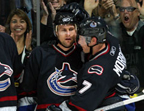 So up in the true north, and various parts of the deep south, the National Hockey League (which nation is that, remind me?) is back after only a years’ absence. And the land is strong again.
So up in the true north, and various parts of the deep south, the National Hockey League (which nation is that, remind me?) is back after only a years’ absence. And the land is strong again.
By this time next week the Canadian Broadcasting Corporation will be back again too. And John Ibbitson has come up with the ultimate wisdom on a very early Canadian federal election.
Meanwhile, the Iraq constitutional referendum is blowing in the wind. Cindy Sheehan has finally been arrested. Mike Zwerin has told the truth about jazz in New Orleans. New US Chief Justice John Roberts has some class. Hugo Chavez in oil-rich Venezuela is throwing darts at the elephant. Canadians are somewhat less willing to travel to the US. And I am still crazy enough after all these years to yearn for an improbable Down in the (Mississippi) Valley World Series, between Chicago and St. Louis.
What you have here, that is to say, is another perplexed top 10 list, amid the great rush of confusing events in our more and more interesting times. Those bold enough to dare can read further for a few further details.
 1. A record-setting total of more than 275,000 National Hockey League fans ushered in the 2005-06 regular season by packing arenas for the 15 opening-night games on Wednesday, October 5. Ironically enough, the single highest attendance was in the deep south of Florida, where more than 22,000 watched Tampa Bay’s 2004 Stanley Cup champions win their first game of the new season. Back up north the Vancouver Canucks slightly marred the Great Gretzky’s debut as an NHL coach by defeating his visiting team from the desert in Phoenix. For more on the “total of 95 goals” scored in all 15 games check out the league’s excited new website.
1. A record-setting total of more than 275,000 National Hockey League fans ushered in the 2005-06 regular season by packing arenas for the 15 opening-night games on Wednesday, October 5. Ironically enough, the single highest attendance was in the deep south of Florida, where more than 22,000 watched Tampa Bay’s 2004 Stanley Cup champions win their first game of the new season. Back up north the Vancouver Canucks slightly marred the Great Gretzky’s debut as an NHL coach by defeating his visiting team from the desert in Phoenix. For more on the “total of 95 goals” scored in all 15 games check out the league’s excited new website.
2. Back up north again, the “Honourable Joe Fontana, Minister of Labour and Housing is pleased to confirm that the Canadian Broadcasting Corporation (CBC) and the Canadian Media Guild (CMG) parties have finalized an agreement and employees are scheduled to return to work on Tuesday, October 11, 2005. This is great news for Canadians who have been missing their public broadcaster’, said Minister Fontana.” (Well … maybe. It also makes you wonder just what the modern labour movement’s founders of the late 19th and early 20th centuries would think about unions of well-fed professional hockey players and CBC television producers?)
 3. Now that the 38th Parliament of Canada has been back in business for more than a week, the prospects for a snap federal election are growing dimmer. Globe and Mail columnist John Ibbitson notes that the Conservatives don’t want to try to defeat the government this time around without Jack Layton’s New Democrats in on the plot too. “A November election call remains a remote possibility,” but only if Mr. Layton makes what now seem some unlikely calculations – especially after Liberal “House Leader Tony Valeri announced yesterday that the first opposition day, in which a motion of no confidence can be brought against the government, will be Nov. 14.” Other political surprises are still conceivable, no doubt. And the still “potentially explosive” first Gomery report on the sponsorship scandal is now only a few weeks away. But on Ibbitson’s view: “There is very little chance that there will be an election before the spring. Unless Jack Layton changes his mind.”
3. Now that the 38th Parliament of Canada has been back in business for more than a week, the prospects for a snap federal election are growing dimmer. Globe and Mail columnist John Ibbitson notes that the Conservatives don’t want to try to defeat the government this time around without Jack Layton’s New Democrats in on the plot too. “A November election call remains a remote possibility,” but only if Mr. Layton makes what now seem some unlikely calculations – especially after Liberal “House Leader Tony Valeri announced yesterday that the first opposition day, in which a motion of no confidence can be brought against the government, will be Nov. 14.” Other political surprises are still conceivable, no doubt. And the still “potentially explosive” first Gomery report on the sponsorship scandal is now only a few weeks away. But on Ibbitson’s view: “There is very little chance that there will be an election before the spring. Unless Jack Layton changes his mind.”
 4. In the mysterious Middle East, the referendum on Iraq’s new constitution is still scheduled for Saturday, October 15. No matter how strongly you believe that George W. Bush, Tony Blair, and the other coalition partners ought to start changing course on the Iraq war right away, it does not make much sense to hope that the Iraq referendum fails too. Former US liberal diplomat Peter Galbraith, who “was in Baghdad in July and August and participated in many of the discussions surrounding the writing of the Iraqi Constitution,” has now explained why in the New York Review of Books. (And his thoughts are seconded by liberal University of Toronto professor David Cameron, who has also been in Baghdad this year, in the latest issue of the U of T political science department newsletter, Discourse.)
4. In the mysterious Middle East, the referendum on Iraq’s new constitution is still scheduled for Saturday, October 15. No matter how strongly you believe that George W. Bush, Tony Blair, and the other coalition partners ought to start changing course on the Iraq war right away, it does not make much sense to hope that the Iraq referendum fails too. Former US liberal diplomat Peter Galbraith, who “was in Baghdad in July and August and participated in many of the discussions surrounding the writing of the Iraqi Constitution,” has now explained why in the New York Review of Books. (And his thoughts are seconded by liberal University of Toronto professor David Cameron, who has also been in Baghdad this year, in the latest issue of the U of T political science department newsletter, Discourse.)
 5. Back in the USA one somewhat surprising thing about Iraq war protester Cindy Sheehan is that it took her up until last week to get “arrested with more than 350 other people after a protest outside the White House.” Even George W. Bush’s America remains a democracy, so far, and Ms. Sheehan has not been permanently confined. On the same Wednesday, October 5 that the National Hockey League began its 20052006 season: “Peace mom Cindy Sheehan, after wrapping up her tour of the country, returned home … to northern California where she plans to continue her protest of the Iraq war.”
5. Back in the USA one somewhat surprising thing about Iraq war protester Cindy Sheehan is that it took her up until last week to get “arrested with more than 350 other people after a protest outside the White House.” Even George W. Bush’s America remains a democracy, so far, and Ms. Sheehan has not been permanently confined. On the same Wednesday, October 5 that the National Hockey League began its 20052006 season: “Peace mom Cindy Sheehan, after wrapping up her tour of the country, returned home … to northern California where she plans to continue her protest of the Iraq war.”
6. In the wake of Hurricane Katrina, Paris-based jazz writer (and former US-based jazz musician) Mike Zwerin has finally told the truth about New Orleans jazz today: “It has taken a few weeks for me to drum up the courage to write this but, while nobody is happy about the drowning and the death and destruction in the birthplace of America’s only native art form, the fact remains that the prehistoric jazz music New Orleans is noted for had already been under water for nigh on to half a century … The music was hit by tragedy a long time ago, and the modern-day flood might even be good for it in the long run.”
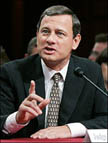 7. The arresting first sentence of long-seasoned civil rights lawyer William L. Taylor’s recent report on the new US Chief Justice John Roberts makes you stop and think: “The most intriguing question about John Roberts is what led him as a young person whose success in life was virtually assured by family wealth and academic achievement to enlist in a political campaign designed to deny opportunities for success to those who lacked his advantages.” On closer inspection it would seem wrong to suggest that John Roberts comes from as privileged a background as George W. Bush (or even John Kerry). Roberts’s father was “an executive with Bethlehem Steel.” Though born in Buffalo, NY, Roberts spent most of his youth in “the affluent beachside town of Long Beach, Indiana,” and attended “a Catholic boarding school in LaPorte, Indiana,” before going on to Harvard. It is also said that he “spent his summers working in a steel mill to help pay for college” (at Bethlehem Steel where his father was an executive presumably?)Â However you cut it, even someone from a mere “upper middle class” background like this is not going to have quite the same grasp on everyday life in America as someone from … well, Hope, Arkansas, say. And …Â why is none of this ever exactly made clear on TV? (Well, that is a dumb question, but … )
7. The arresting first sentence of long-seasoned civil rights lawyer William L. Taylor’s recent report on the new US Chief Justice John Roberts makes you stop and think: “The most intriguing question about John Roberts is what led him as a young person whose success in life was virtually assured by family wealth and academic achievement to enlist in a political campaign designed to deny opportunities for success to those who lacked his advantages.” On closer inspection it would seem wrong to suggest that John Roberts comes from as privileged a background as George W. Bush (or even John Kerry). Roberts’s father was “an executive with Bethlehem Steel.” Though born in Buffalo, NY, Roberts spent most of his youth in “the affluent beachside town of Long Beach, Indiana,” and attended “a Catholic boarding school in LaPorte, Indiana,” before going on to Harvard. It is also said that he “spent his summers working in a steel mill to help pay for college” (at Bethlehem Steel where his father was an executive presumably?)Â However you cut it, even someone from a mere “upper middle class” background like this is not going to have quite the same grasp on everyday life in America as someone from … well, Hope, Arkansas, say. And …Â why is none of this ever exactly made clear on TV? (Well, that is a dumb question, but … )
 8. As the MSN Money website puts it: “Venezuela has transferred about half of its $30.4bn of foreign reserves out of US Treasuries and US banks into banks in Europe, seemingly for political reasons … The decision which was disclosed in an off-the-cuff comment by President Hugo Chvez last week, has fuelled confusion among bondholders and analysts.” According to Steve Barrow, chief currency strategist at Bear Stearns: “We don’t think that the [Venezuela] story itself is all that significant, but coming at a time when US stocks were collapsing as well, it did seem to trip the dollar.” According to Alma Guillermoprieto in the New York Review of Books, Hugo Chavez’s government in Venezuela is “Sometimes … anti-capitalist, and sometimes not … a great many businessmen have prospered under his rule, and he has made it clear that he sees a significant role for the private sector and … foreign investment. What there does not appear to be much room for is the opposition” inside Venezuela itself.
8. As the MSN Money website puts it: “Venezuela has transferred about half of its $30.4bn of foreign reserves out of US Treasuries and US banks into banks in Europe, seemingly for political reasons … The decision which was disclosed in an off-the-cuff comment by President Hugo Chvez last week, has fuelled confusion among bondholders and analysts.” According to Steve Barrow, chief currency strategist at Bear Stearns: “We don’t think that the [Venezuela] story itself is all that significant, but coming at a time when US stocks were collapsing as well, it did seem to trip the dollar.” According to Alma Guillermoprieto in the New York Review of Books, Hugo Chavez’s government in Venezuela is “Sometimes … anti-capitalist, and sometimes not … a great many businessmen have prospered under his rule, and he has made it clear that he sees a significant role for the private sector and … foreign investment. What there does not appear to be much room for is the opposition” inside Venezuela itself.
 9. According to a recent Globeandmail.com online poll in Canada, only 39% of more than 20,000 respondents answered Yes to the question “Are you as willing to travel to the United States as you once were? (No doubt similar results would be found in any such poll on the other side of the line, if such a thing ever were to exist.) Meanwhile: “Prodded by the Canadian embassy, a growing informal coalition of US border politicians, including Senator Hillary Clinton and New York Governor George Pataki, is pushing for the U.S. government to drop its plan to require passports to cross the Canadian border.”
9. According to a recent Globeandmail.com online poll in Canada, only 39% of more than 20,000 respondents answered Yes to the question “Are you as willing to travel to the United States as you once were? (No doubt similar results would be found in any such poll on the other side of the line, if such a thing ever were to exist.) Meanwhile: “Prodded by the Canadian embassy, a growing informal coalition of US border politicians, including Senator Hillary Clinton and New York Governor George Pataki, is pushing for the U.S. government to drop its plan to require passports to cross the Canadian border.”
 10. As of very early in the morning of Friday, October 7, the Chicago White Sox and the St. Louis Cardinals are the only two teams who remain undefeated in the Major League Baseball playoffs. People who actually know something about baseball still seem to be saying that there is no way these two teams will finally wind up in the World Series. But it would seem peculiarly suited to the times we are living through in 2005 if they did. Hurricane Katrina struck maliciously at the great seaport of the Mississippi Valley transportation corridor of Middle America, that has played such an important role in the story of the USA – and even North America at large. Chicago is, so to speak, the great metropolis at the other Great Lakes end of the corridor, and St. Louis is the great metropolis of the middle (and historic gateway to the Great West). And Middle America itself – as opposed to more outward-looking Bi-Costal America – is what has put George W. Bush in the White House, and all the conservative Republicans in Congress, where they almost all so cryptically remain, in the current Age of the Old Nostalgia in America. A Mississippi Valley World Series, between Chicago and St. Louis, just might be the best way of starting to say a nostalgic Mark Twain hello to some new and more realistic era, in America and all of the global village. (And now, in any case, it’s on to the mysterious Canadian Thanksgiving weekend, up north, where in theory it gets colder earlier than way down south.)
10. As of very early in the morning of Friday, October 7, the Chicago White Sox and the St. Louis Cardinals are the only two teams who remain undefeated in the Major League Baseball playoffs. People who actually know something about baseball still seem to be saying that there is no way these two teams will finally wind up in the World Series. But it would seem peculiarly suited to the times we are living through in 2005 if they did. Hurricane Katrina struck maliciously at the great seaport of the Mississippi Valley transportation corridor of Middle America, that has played such an important role in the story of the USA – and even North America at large. Chicago is, so to speak, the great metropolis at the other Great Lakes end of the corridor, and St. Louis is the great metropolis of the middle (and historic gateway to the Great West). And Middle America itself – as opposed to more outward-looking Bi-Costal America – is what has put George W. Bush in the White House, and all the conservative Republicans in Congress, where they almost all so cryptically remain, in the current Age of the Old Nostalgia in America. A Mississippi Valley World Series, between Chicago and St. Louis, just might be the best way of starting to say a nostalgic Mark Twain hello to some new and more realistic era, in America and all of the global village. (And now, in any case, it’s on to the mysterious Canadian Thanksgiving weekend, up north, where in theory it gets colder earlier than way down south.)
OCTOBER 20 UPDATE: So now the prospect of a Mississippy Valley World Series has alas vanished altogether, with Houston’s sad defeat of St. Louis last night. The real 2005 World Series that starts this weekend will be pitting Texas (the homeland of George W. Bush) against Illinois (the homeland of Abraham Lincoln – the original great Republican). America, it would seem, is not quite ready to get altogether sensible yet. This year there will be a Blue State/Red State World Series that highlights the continuing divisions of the USA.
From the counterweights editors, October 3-6: MORE CANADIAN BUBBLES .. New polls .. Canada and Mexico in NAFTA .. Gateway to Asia in BC ..
 Two late September polls on Canadian federal party standings have now challenged the mid-September Leger Marketing survey’s highly positive results for Paul Martin’s Liberals. They suggest better news for both Stephen Harper’s Conservatives and Jack Layton’s New Democrats.
Two late September polls on Canadian federal party standings have now challenged the mid-September Leger Marketing survey’s highly positive results for Paul Martin’s Liberals. They suggest better news for both Stephen Harper’s Conservatives and Jack Layton’s New Democrats.
At the moment who knows just what this means for the prospects of a snap fall 2005 federal election? But it does throw cold water on any firm theory that the Martin Liberals increasingly have the momentum for a majority government, in an election called after the second Gomery report on February 1, 2006. (And a third poll just released on Monday, October 3, while somewhat more encouraging for the Liberals, does not seem to alter this picture in any major way.)
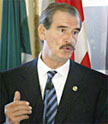 Meanwhile, the Martin government continues to work on a more aggressive and diversified Canadian trade agenda – as one argument in its case to the voters, whenever the next federal election comes. And a US Associated Press report has noted that, in Vancouver this past Friday, “Mexican President Vicente Fox criticized the Bush administration … for ignoring a recent NAFTA panel ruling that favored Canada in their long-standing lumber dispute.”
Meanwhile, the Martin government continues to work on a more aggressive and diversified Canadian trade agenda – as one argument in its case to the voters, whenever the next federal election comes. And a US Associated Press report has noted that, in Vancouver this past Friday, “Mexican President Vicente Fox criticized the Bush administration … for ignoring a recent NAFTA panel ruling that favored Canada in their long-standing lumber dispute.”
President Fox also met with Prime Minister Martin in Vancouver, to discuss key current concerns of the smaller NAFTA partners on “the mining, transport and energy sectors,” and “security, health and environmental issues.” At the same time, Martin “promised … a major federal effort to help Canada capitalize on booming growth in China and India.” Officials say this “will likely include a $560-million down payment for gateway’ infrastructure in BC and the construction of a new Western Canadian-focused body to oversee federal spending.”
The two new polls …Â (er … make that three)
 One of the two new polls that have apparently boosted Stephen Harper’s fortunes somewhat is an internal Conservative survey – conducted by the “party’s pollster, Praxicus Public Strategies Inc.” Not too surprisingly, this is also the poll that presents the most optimistic picture for the Tories.
One of the two new polls that have apparently boosted Stephen Harper’s fortunes somewhat is an internal Conservative survey – conducted by the “party’s pollster, Praxicus Public Strategies Inc.” Not too surprisingly, this is also the poll that presents the most optimistic picture for the Tories.
The end date for the survey period in this Praxicus Conservative poll is September 23. It puts Liberals at 33% of decided voters, Conservatives at 29%, and New Democrats at 20%. A more neutrally financed Decima poll with an end date of September 26 also puts the Conservatives at 29%. But this Decima poll puts the Liberals at 36% and the New Democrats at 17%.
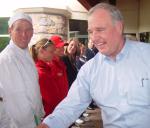 In either case the Liberals are not as high as the 40% they were assigned in a September 11 Leger Marketing poll. (Which given the strange political arithmetic of Canada’s first-past-the-post electoral system, could bring Paul Martin’s “natural governing party” within striking distance of a majority of seats in Parliament.) The Conservatives are not as low as the 24% – or the New Democrats as low as the 15% – that they were assigned in the Leger poll.
In either case the Liberals are not as high as the 40% they were assigned in a September 11 Leger Marketing poll. (Which given the strange political arithmetic of Canada’s first-past-the-post electoral system, could bring Paul Martin’s “natural governing party” within striking distance of a majority of seats in Parliament.) The Conservatives are not as low as the 24% – or the New Democrats as low as the 15% – that they were assigned in the Leger poll.
At the same time, as far as the Canada-wide percentages of popular support for each party go, the September 26 Decima poll is quite similar to an August 18 Ipsos-Reid poll – or even an Ipsos-Reid poll from the beginning of the summer at the end of June.
Again, who can say just what all this might finally mean – beyond the grizzled wisdom that the only poll which counts is the next election? Yet, whatever else, the September 11 Leger poll’s hints of a breakthrough from the past several months’ pattern of a minority government regardless have not been confirmed by the September 26 Decima poll.
Pending the next batch of tea leaves from the pollsters’ arts and crafts, this suggests that the Liberals are not exactly going to be cake-walking through the next four months. There still appears to be some room for further surprises ahead in Canadian federal politics.
|
Decima Sep 26 |
Praxicus CI Sep 23 |
Leger Sep 11 |
Ipsos-Reid Aug 18 |
Ipsos-Reid June 23 |
|
|
Liberal |
36 |
33 |
40 |
36 |
35 |
|
Conservative |
29 |
29 |
24 |
28 |
27 |
|
NDP |
17 |
20 |
15 |
17 |
18 |
|
BQ |
|
|
13 |
11 |
13 |
|
Greens |
|
|
|
6 |
6 |
[And now, an new Ipsos-Reid poll has just been released on October 3. Its end date is September 29, and cross-Canada it “reveals a substantial 10-point gap in decided voter support between Paul Martin and the Liberals (37%, +1 point from an August 16-18th survey) and Stephen Harper and the Conservatives (27%, -1 point). The NDP (17%, -1 point) and the Green Party (4%, -2 points) trail the two leading parties distantly … In Quebec, the Bloc Quebecois (58%, +11 points) has gained substantial ground since the last survey and now hold a 32-point lead over the Liberals (26%, unchanged).” More to come later.]
Where do the Conservatives and New Democrats stand on Canadian trade policy?
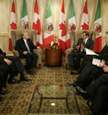 Whatever political party you may or may not support, just in the abstract it makes quite a lot of sense for Canada to be discussing its current concerns about the North American Free Trade Agreement with Mexico right now. (And the September 11 Leger poll, in which the Liberals did so well, did happen to coincide with another several days when Paul Martin appeared be having some luck internationally, with Hu Jintao’s Canadian visit and the UN summit in New York.)
Whatever political party you may or may not support, just in the abstract it makes quite a lot of sense for Canada to be discussing its current concerns about the North American Free Trade Agreement with Mexico right now. (And the September 11 Leger poll, in which the Liberals did so well, did happen to coincide with another several days when Paul Martin appeared be having some luck internationally, with Hu Jintao’s Canadian visit and the UN summit in New York.)
Mexican President Vicente Fox’s Canadian visit also included meetings in Calgary this past Thursday, as well as Vancouver on Friday. President Fox was accompanied by “30 Mexican businessmen.” Both Canada and Mexico, the Associated Press reported, “are hoping the visit to Alberta and British Columbia – with two of Canada’s hottest economies – will lead to expanded business ties.”
Martin’s parallel Vancouver announcement that the “federal cabinet is currently considering a gateway package that includes $560 million to help BC build or improve road and rail transportation corridors linking Canada’s economy to booming Asian markets through BC’s deep-sea ports” had its own sightings on the next federal election. (And then there’s the concept of an “advisory council … called the Gateway Council,” which “would be made up of federal and Western Canadian government officials, as well as business leaders, who will make sure the federal cash is being spent wisely.” Mmmm … )
Starting to carve some aggressive and more diverse fresh beginnings for Canadian international trade and economic development policy does seem to be shaping up as one potential Liberal weapon in the next election, whenever it comes. And this makes you wonder a bit about where both the Conservatives and the New Democrats stand on such things (or even Gilles Duceppe and the Bloc Quebecois)?
One casual impression would be that Stephen Harper’s Conservatives still seem a little too deeply into over-reliance on the of-course-always-central US connection on this front. Even from a North American standpoint that also has friends among more progressive currents in the US, more vigorous Canadian trade policy exertions on China and India could be constructive over the mid to longer term. And, on the same kind of high-minded time horizon, better relations between Canada and Mexico can arguably only be good for the US too.
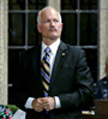 The New Democrats similarly still often appear too trapped in hopelessly romantic visions of Canadian economic autarchy and quaint old theories of national economic isolation. At least a good many Canadian voters still combine their concerns for continuing Canadian national development with some appreciation of how innovative social policy also requires an innovative international economic base. And it remains hard to see how even Jack Layton’s new and improved NDP will be cutting into the Liberal share of the market in this connection.
The New Democrats similarly still often appear too trapped in hopelessly romantic visions of Canadian economic autarchy and quaint old theories of national economic isolation. At least a good many Canadian voters still combine their concerns for continuing Canadian national development with some appreciation of how innovative social policy also requires an innovative international economic base. And it remains hard to see how even Jack Layton’s new and improved NDP will be cutting into the Liberal share of the market in this connection.
Of course, if the real-world of politics is mostly about such things as the two upcoming Gomery reports on the Liberal sponsorship scandal, then all of this is just smoke and mirrors that doesn’t matter much. But as things look for the moment at least, who is going to bet the house on that?
There is still in fact quite a lot, you would think, that does need debating about Canadian international trade and economic development policy in the early 21st century. And it does seem at least conceivable that some voters would be suitably impressed if Parliament started digging into this subject constructively over the fall and winter of 2005-2006.

